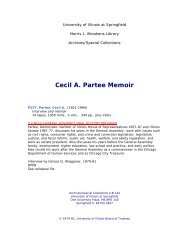Mary Jane Roach Masters Memoir - University of Illinois Springfield
Mary Jane Roach Masters Memoir - University of Illinois Springfield
Mary Jane Roach Masters Memoir - University of Illinois Springfield
Create successful ePaper yourself
Turn your PDF publications into a flip-book with our unique Google optimized e-Paper software.
Q. What were your childhood surroundings like?<br />
A. Oh, I was an apartment child. (Chuckle) Very happy. I'm sorry to say I have no tragedies to<br />
recall in my childhood.( Chuckle)<br />
Q. Do you have fond memories <strong>of</strong> anything in particular? Chicago in the fifth grade?<br />
A. (Chuckle) Yes, that was fun. That was lots <strong>of</strong> fun. We moved to Chicago for a year and a<br />
half when I was ten and I loved it because I was old enough to have a certain amount <strong>of</strong> freedom.<br />
I was having my teeth straightened and I had to go down into 'the Loop' alone, and my mother<br />
permitted me to go on the elevated alone. She must have died a thousand deaths but I was never<br />
disturbed or worried at all about it. Anyway, we didn't know many people so we drove around a<br />
great deal, and to this day I know my way around Chicago better than I know my way around St.<br />
Louis which, <strong>of</strong> course, is an 18th Century city whereas Chicago is a 20th century city built on the<br />
grid.<br />
Q. Tell us something about St. Louis a little bit. Through this paper you wrote. .<br />
A. Well, <strong>of</strong> course, it has a very long and interesting history because it really coincides with the<br />
Louisiana Purchase, Jefferson's Louisiana Purchase, and its been under several countries' control;<br />
the Spaniards and the French, the English and the Americans. Four flags, I believe, have gone up<br />
over St. Louis, but it finally became an American city in the 18th Century and in the 19th Century<br />
it was very interesting in that it had a tremendous immigration, not only from the Irish but also the<br />
Germans, and it became a really quite Teutonic city and later they were very active in the<br />
Unitarian Church also so that it was a combination with the Bostonian thing; the Unitarian is the<br />
Eliot family, for example plus the wonderful South St. Louis Germans who supported<br />
Washington <strong>University</strong> and the Unitarian Church. Of course, there was also St. Louis <strong>University</strong><br />
in the city with which I never had any connection until years later when I was working with the<br />
Humanities at the SIU Medical School and took a Literature and Medicine course from a very<br />
bright pr<strong>of</strong>essor, a night school thing at St. Louis <strong>University</strong>. It was my discovery <strong>of</strong> St. Louis<br />
<strong>University</strong> which is the oldest Catholic <strong>University</strong> west <strong>of</strong> the Mississippi. But these were<br />
separate worlds.<br />
Q. I'm surprised you didn't become a historian rather than an English major.<br />
A. Well you learn a great deal about history through literature and it's always been a part <strong>of</strong> my<br />
interests in life. And I took languages as well.<br />
Q. Were you a reader and inquisitive?<br />
A. Yes, a voracious reader. My father was always very pleased about this but said, "Don't be a<br />
bookworm, go out and exercise." (Chuckle)

















